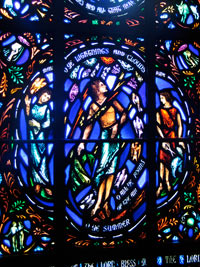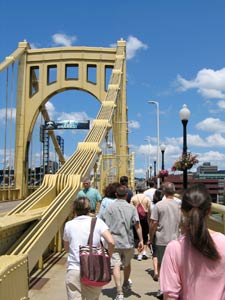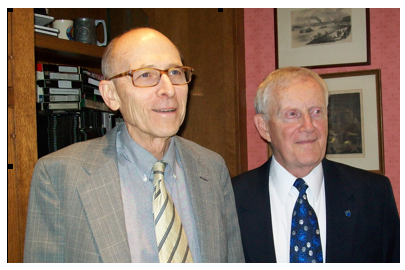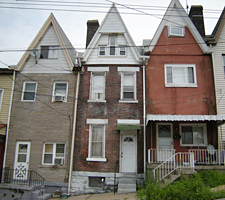
Category Archive: PHLF News
-
Building Pride / Building Character Teacher Workshop
Thanks to a grant from The Fine Foundation, PHLF offered a 3-credit summer workshop for teachers designed to give them the knowledge and resources they need to adapt a curriculum unit to their school or community in a way that builds student pride, achievement, and character.
-
8 Seats to Fill: Stained Glass Studio Bus Tour
 Join us for a bus tour on Friday, September 4 (9:15 a.m. to 1:15 p.m.) to two major Pittsburgh studios that trace their origins to the early years of the stained glass craft in the city.
Join us for a bus tour on Friday, September 4 (9:15 a.m. to 1:15 p.m.) to two major Pittsburgh studios that trace their origins to the early years of the stained glass craft in the city.Nicholas Parrendo, a recent recipient of the Lifetime Achievement Award of the American Glass Guild, will lead the tour of Hunt Stained Glass Studios.
Kirk Weaver, an authority on the history of stained glass in the U.S. and a leader in stained glass restoration, will lead the tour of Stained Glass Resources.
Click here for details/reservations for this tour and for two more special events in PHLF’s series, “Charles J. Connick: World-Class Stained Glass in Pittsburgh.”
-
“Walking Our Mainstreets” Free Saturday Tours: September Thru November 7th
 Beginning on Saturday, September 5, PHLF will lead afternoon walking tours of 10 city mainstreets in cooperation with the Urban Redevelopment Authority of Pittsburgh and Mainstreets Pittsburgh.
Beginning on Saturday, September 5, PHLF will lead afternoon walking tours of 10 city mainstreets in cooperation with the Urban Redevelopment Authority of Pittsburgh and Mainstreets Pittsburgh.Each week features a different mainstreet. Tours are from 2:00 to 3:30 p.m.
Special bonus: Anyone who attends all ten tours will be given Life’s Riches, a PHLF publication.
-
Free Walking Tours Every Friday Through October
 By Louise Sturgess
By Louise Sturgess
PHLF News
August 4, 2009Each month at Noon our expert guides who know and love Pittsburgh lead free walking tours of specific urban areas.
Join us on a Friday in August to explore Fourth Avenue, on a Friday in September to explore Allegheny River Bridges and River Shores, and on a Friday in October to explore Oakland’s Civic Center.
-
Greene County Conservation Easement to Protect Farm
 By Jack Miller
By Jack Miller
PHLF News
August 4, 2009Charles Evans Hunnell has donated a preservation and conservation easement to Landmarks that will protect his 136-acre farm located just west of Waynesburg, PA.
The easement will not only help to preserve the farm-related buildings on the century-old farm but also protect its land from commercial development.
Mr. Hunnell also made a gift to endow the monitoring of the easement in perpetuity.
This is the second Greene County farm protected by Landmarks and brings to 10 the number of properties on which Landmarks has obtained a historic preservation and conservation easement in the past four months.
-
Thank You Volunteer Interns
PHLF welcomes college and graduate students as volunteer interns throughout the year––and we are fortunate to have each one of them helping with educational programs, preservation activities, photography, and research.
Recently, we have been especially fortunate to have Evan Regan-Levine (Georgetown University), Kelley Folts (Virginia Tech), Erin Shilling (Oakbridge Academy of Art), and Jenna Houseman, Sydney Karpowich and Laura Becker, all from the University of Pittsburgh.
-
Neighborhood & Main Street Properties Available
Pittsburgh History & Landmarks Foundation
Main Street Properties for Sale & Lease: Click Here
Market at Fifth: Apartments & Retail Space in Pittsburgh’s Historic Downtown
From time to time, PHLF lists other properties for sale and lease. These listings can be found here when they are available.
——————————————————————————————————————-
Links Provided For Your Convenience, does not imply endorsement.
City of Pittsburgh Properties For Sale
The City of Pittsburgh, in an effort to reduce the number of vacant or abandoned properties, has created sources that offers a menu of properties for sale. Many of these properties are in Pittsburgh’s most historic neighborhoods.

The Real Estate Division of the Department of Finance and the Urban Redevelopment Authority accepts inquiries from the general public for purchase of those properties.
Properties for Sale
Court Auction Sales
Sealed Bid Sales
Side Yard Sales
Vacant Lots for Sale
-
Act Now to Take Advantage of and to Preserve the Enhanced Federal Tax Incentive for Easements
Any individual who donates a preservation easement to a qualified charity, such as Landmarks, is allowed to deduct the value of the easement as a charitable contribution, provided the donation meets certain requirements specified in the Tax Code. Congress recently increased the incentives for donating conservation easements by raising the deduction limit for charitable donations of conservation easements to 50% of an individual’s adjusted gross income, 100% in the case of certain donations with respect to farmland, and extending the carry-forward period for donations that exceed that limit to 15 years. These enhanced deduction limits are set to expire on December 31, 2009. After that date, unless Congress acts, donations of conservation easements will be deductible only to the extent of 30% of adjusted gross income and the carry-forward period for excess donations will be reduced to 5 years.Landmarks accepts donations of preservation easements on historic buildings and farms. To date, Landmarks has received more than twenty preservation easements, protecting a wide range of historic properties including major downtown commercial buildings, unique residential structures, and approximately 1,600 acres of farmland.If you are interested in donating a preservation easement on your historic home, you need to act by December 31, 2009 in order to take advantage of the increased deduction limit.If you think Congress should encourage historic preservation by making the increased deduction limit permanent, you are not alone. Bipartisan legislation has been introduced in Congress to make the enhanced incentives permanent through the Conservation Easement Incentive Act, H.R. 1831, and the Rural Heritage Conservation Act, S. 812. To learn more about the enhanced tax incentives for conservation easements and how you can help make them permanent, please visit The Land Trust Alliance’s website at www.lta.org.Any individual who donates a preservation easement to a qualified charity, such as Landmarks, is allowed to deduct the value of the easement as a charitable contribution, provided the donation meets certain requirements specified in the Tax Code.
Congress recently increased the incentives for donating conservation easements by raising the deduction limit for charitable donations of conservation easements to 50% of an individual’s adjusted gross income, 100% in the case of certain donations with respect to farmland, and extending the carry-forward period for donations that exceed that limit to 15 years.
These enhanced deduction limits are set to expire on December 31, 2009. After that date, unless Congress acts, donations of conservation easements will be deductible only to the extent of 30% of adjusted gross income and the carry-forward period for excess donations will be reduced to 5 years.
Landmarks accepts donations of preservation easements on historic buildings and farms. To date, Landmarks has received more than twenty preservation easements, protecting a wide range of historic properties including major downtown commercial buildings, unique residential structures, and approximately 1,600 acres of farmland.
If you are interested in donating a preservation easement on your historic home, you need to act by December 31, 2009 in order to take advantage of the increased deduction limit.
If you think Congress should encourage historic preservation by making the increased deduction limit permanent, you are not alone. Bipartisan legislation has been introduced in Congress to make the enhanced incentives permanent through the Conservation Easement Incentive Act, H.R. 1831, and the Rural Heritage Conservation Act, S. 812.
To learn more about the enhanced tax incentives for conservation easements and how you can help make them permanent, please visit The Land Trust Alliance’s website at www.lta.org.
